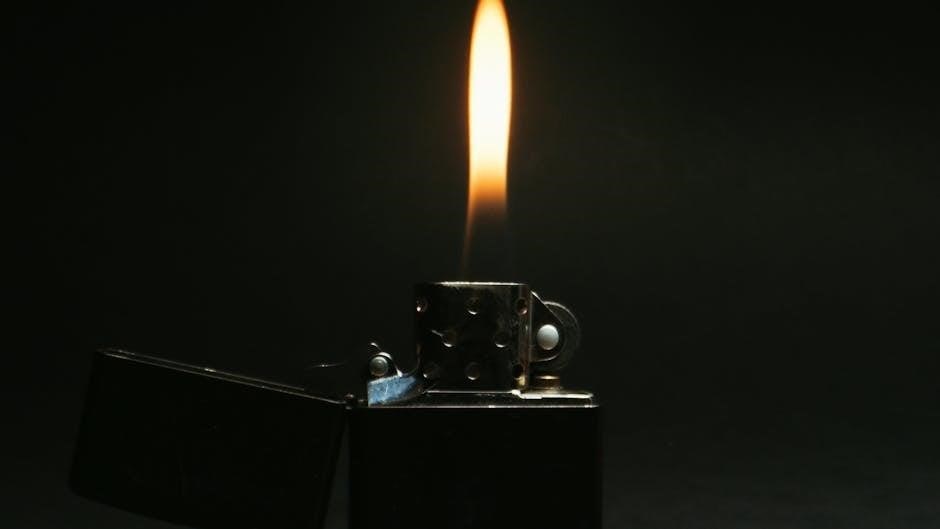The AC Delco Spark Plug Heat Range Chart is a guide to selecting the correct spark plug for optimal engine performance and longevity. It helps determine the ideal heat range for various driving conditions, ensuring proper combustion and engine efficiency. The chart categorizes plugs like resistor, platinum, and iridium types, each designed for specific engine needs.

What is the Heat Range Chart?
The AC Delco Heat Range Chart is a guide that helps identify the correct spark plug heat range for specific engines. It uses numeric codes to denote heat dissipation levels, ensuring optimal engine performance by matching plugs to operating conditions.
2.1 Definition and Purpose
The AC Delco Spark Plug Heat Range Chart defines the thermal characteristics of spark plugs, indicating how well they dissipate heat. It categorizes plugs into heat ranges, with lower numbers representing hotter plugs and higher numbers signifying colder ones. The chart’s purpose is to help users select the correct plug for their engine, ensuring optimal combustion, preventing overheating or fouling, and maximizing engine performance and longevity.
2.2 Structure and Components
The AC Delco Heat Range Chart is structured to decode spark plug specifications. It includes prefix and suffix letters identifying plug type, thread size, and heat range. Numbers denote thread size and heat range, while suffixes indicate features like extended tips or tapered seats. The chart also details plug constructions, such as resistor or platinum types, guiding users to match plugs with their engine requirements for enhanced performance and durability.

Factors Affecting Spark Plug Heat Range
Engine type, performance demands, driving conditions, and spark plug design influence heat range. Proper selection ensures optimal thermal management, preventing issues like fouling or premature wear.
3.1 Engine Type and Performance Requirements
Engine type and performance demands significantly impact spark plug heat range. Gasoline engines require different heat ranges compared to diesel engines due to varying combustion temperatures. High-performance engines often need colder plugs to manage increased heat, while smaller engines may prefer hotter plugs to prevent carbon buildup. Engine size, compression ratio, and turbocharging also influence heat range selection. Proper matching ensures optimal combustion efficiency and prevents damage from overheating or fouling.
3.2 Driving Conditions and Environment
Driving conditions and environment play a crucial role in determining the appropriate heat range. Vehicles driven in extreme temperatures, towing heavy loads, or frequently idling benefit from colder plugs to dissipate heat effectively. Conversely, city driving or moderate climates may favor hotter plugs to maintain efficient combustion. Environmental factors like humidity and altitude also influence heat range selection to ensure optimal engine performance and prevent issues like fouling or premature wear.
3.3 Spark Plug Design and Technology
Spark plug design and technology significantly influence heat range. Resistor plugs reduce radio frequency interference, while platinum and iridium plugs offer longer life and better fuel efficiency. Fine-wire tips improve ignition, and copper cores enhance heat dissipation. AC Delco’s advanced materials ensure optimal heat transfer and durability. Plug design variations, such as projected tips or tapered seats, cater to specific engine requirements. Proper plug selection based on design ensures efficient combustion and prevents issues like fouling or overheating.

How to Interpret the AC Delco Heat Range Chart
The chart helps determine the correct spark plug heat range by matching thread size, tip type, and thermal characteristics to engine specifications for optimal performance.
4.1 Step-by-Step Guide
Identify your vehicle’s engine type and performance requirements.
Locate the spark plug code from your vehicle’s manual or the plug itself.
Refer to the AC Delco Heat Range Chart to match the code with thread size, tip type, and heat range.
Consider driving conditions and engine load to select the appropriate heat range.
Cross-reference the chart to ensure compatibility and optimal performance.
Review and confirm the recommended spark plug for your specific application.
4.2 Practical Examples and Applications
For example, an R45TS plug indicates a resistor type with a 14mm thread, heat range 5, taper seat, and extended tip. This plug is ideal for engines requiring efficient heat dissipation. In high-performance vehicles, a colder plug (higher heat range) is often chosen to prevent overheating; Conversely, for everyday driving, a plug like R46S provides a balanced heat range for optimal fuel efficiency and engine longevity. Always match the plug to your vehicle’s specifications for best results.

Importance of Correct Heat Range for Engine Performance
The correct heat range ensures optimal combustion, prevents fouling, and enhances engine efficiency, while the wrong choice can lead to poor performance or engine damage.
5.1 Impact on Engine Efficiency
A spark plug’s heat range significantly affects engine efficiency. A plug that’s too hot can cause overheating, leading to detonation and reduced fuel efficiency. Conversely, a plug that’s too cold may not burn off carbon deposits efficiently, resulting in fouling and misfires. Proper heat range ensures optimal combustion, maximizing power output and fuel economy while minimizing emissions and wear on engine components. This balance is crucial for maintaining peak performance and longevity.
5.2 Role in Engine Longevity
The correct spark plug heat range is vital for engine longevity. A plug that runs too hot can cause premature wear on engine components, such as pistons and cylinder heads, while a plug that runs too cold can lead to carbon fouling and misfires. Proper heat range ensures consistent combustion, prevents damage from excessive heat or fouling, and maintains optimal engine performance over time, thereby extending the engine’s lifespan and reducing the need for costly repairs.
Types of AC Delco Spark Plugs
AC Delco offers resistor, platinum, and iridium spark plugs. Resistor plugs suppress radio interference, platinum plugs ensure durability, and iridium plugs provide superior ignition and efficiency for modern engines.
6.1 Resistor Spark Plugs
Resistor spark plugs by AC Delco feature a built-in resistor that suppresses radio-frequency interference (RFI), ensuring a cleaner ignition signal. They are ideal for vehicles with sensitive electronics and are designed to maintain optimal performance across various driving conditions. These plugs are cost-effective and provide reliable service life, making them a popular choice for everyday driving applications.
6.2 Platinum Spark Plugs
AC Delco Platinum Spark Plugs feature a fine platinum tip that enhances ignition consistency and durability. Designed for long-lasting performance, they resist wear and tear under high combustion pressures. Platinum plugs provide a reliable spark for efficient combustion, minimizing fouling and misfires. They are ideal for modern engines requiring higher ignition reliability and are compatible with vehicles specifying platinum technology for optimal engine performance and fuel efficiency.
6.3 Iridium Spark Plugs
AC Delco Iridium Spark Plugs utilize a high-performance iridium alloy for the center electrode, offering superior durability and resistance to wear. Their fine wire design ensures a consistent spark, improving combustion efficiency and engine performance. Iridium plugs are ideal for high-performance engines and harsh driving conditions, providing extended service life compared to platinum and copper plugs. They are engineered for vehicles requiring advanced ignition technology to maximize power and fuel efficiency.

Choosing the Right Heat Range for Your Vehicle
Selecting the appropriate heat range for your vehicle involves understanding your engine’s specific needs. Lower heat range plugs are hotter, suitable for high-performance or turbocharged engines, while higher ranges are cooler, ideal for normal driving conditions. AC Delco’s chart helps match plugs to engine type, performance, and driving habits, ensuring optimal combustion and longevity. Always consult the chart or expert advice for precise selection.
7.1 Key Considerations
When selecting the right heat range, consider your vehicle’s engine type, performance requirements, and driving conditions. Lower heat range plugs are hotter, suited for high-performance or turbocharged engines, while higher ranges are cooler, better for normal driving. Consult the AC Delco chart to avoid engine damage and ensure optimal efficiency. Also, consider thread size, tip type, and resistor features for compatibility and performance.
7.2 Expert Recommendations
Experts recommend matching your spark plug selection to your engine’s specifications and driving habits. For high-performance engines, opt for lower heat range plugs, while everyday driving benefits from mid-range options. Always refer to the AC Delco chart for precise recommendations. Consider iridium or platinum plugs for longer lifespan. Avoid guessing, as incorrect heat ranges can damage engines or reduce efficiency. Consult professionals if unsure for optimal performance and durability.

Comparison with Other Spark Plug Brands
AC Delco spark plugs are often compared to NGK and Champion for heat range and durability. NGK plugs are known for colder heat ranges, while Champion offers affordable options. AC Delco excels in balancing performance and cost, making them a popular choice for everyday and high-performance engines. Each brand caters to specific needs, ensuring optimal engine function.
8.1 NGK Spark Plugs
NGK spark plugs are known for their high-quality materials and precise engineering, offering excellent heat dissipation and durability. Unlike AC Delco, NGK plugs often feature copper cores and iridium tips for enhanced performance. Their heat range numbering system is similar, with lower numbers indicating hotter plugs. NGK is a popular choice for high-performance and racing applications, where consistent ignition and thermal stability are critical. They are often compared to AC Delco for their reliability in demanding engine conditions.
8.2 Champion Spark Plugs
Champion spark plugs are renowned for their reliability and durability, offering a wide range of options for various engine types. Their heat range system is designed to match specific engine requirements, ensuring proper combustion and performance. Champion plugs are often favored for their consistent ignition and robust construction, making them a strong competitor to AC Delco in both standard and high-performance applications. Their heat range chart provides clear guidance for selecting the right plug for optimal engine function.
Common Mistakes to Avoid When Selecting Spark Plugs
Common mistakes include selecting the wrong heat range, ignoring engine specifications, and improper installation techniques, which can lead to poor performance or engine damage. Avoid these errors for optimal results.
9.1 Incorrect Heat Range Selection
Incorrect heat range selection is a common mistake that can lead to poor engine performance, reduced efficiency, and potential damage. Choosing a plug that is too hot or too cold for your engine can cause issues like fouling, pre-ignition, or detonation. Always consult the AC Delco heat range chart to ensure the correct plug is selected for your vehicle’s specific needs and operating conditions to avoid these costly errors.
9.2 Improper Installation Techniques
Improper installation of spark plugs can lead to reduced performance, engine damage, and costly repairs. Common mistakes include over-tightening, which can damage threads, and under-tightening, leading to loose plugs. Using the wrong socket size or failing to apply dielectric grease can cause misfires and poor connections. Always follow the manufacturer’s torque specifications and installation guidelines to ensure proper seating and function of the spark plugs.
The AC Delco Spark Plug Heat Range Chart is an essential tool for optimizing engine performance and longevity. Proper heat range selection, avoiding common mistakes, and correct installation techniques are crucial for maximizing efficiency. By understanding and applying the insights from this guide, drivers can ensure their engines run smoothly, reduce maintenance costs, and enhance overall vehicle reliability. Always refer to the chart for precise and informed spark plug choices.
